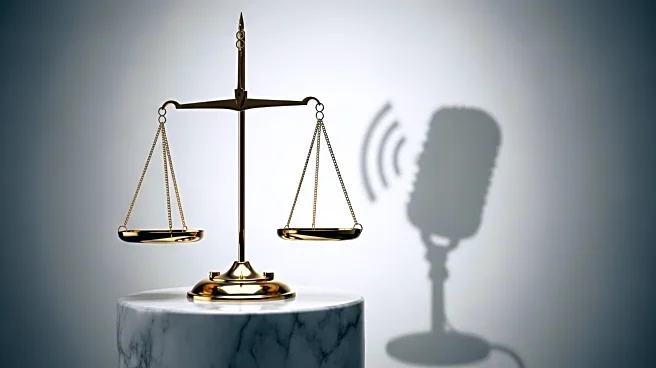What's Happening?
FCC Chair Brendan Carr has threatened action against ABC following comments made by host Jimmy Kimmel, leading to the suspension of Kimmel's show. This move has sparked accusations of government coercion and raised concerns about free speech. The controversy stems from remarks Kimmel made regarding the Republican response to the assassination of conservative activist Charlie Kirk. Critics, including conservative figures like Tucker Carlson and U.S. Sen. Ted Cruz, have expressed worries about the FCC's power to punish speech, arguing that it sets a dangerous precedent for government control over media. The situation has ignited debates about the limits of free speech and the role of government in regulating media content.
Why It's Important?
The actions taken by the FCC and the Trump administration in response to Jimmy Kimmel's comments highlight ongoing tensions surrounding free speech and government influence over media. This situation underscores the broader debate about 'cancel culture,' which has been a contentious issue across political lines. The potential for government coercion in media matters raises alarms about the First Amendment rights and the precedent it sets for future administrations. The suspension of Kimmel's show and the threats against ABC could have significant implications for media companies, journalists, and public discourse, potentially leading to increased self-censorship and a chilling effect on free expression.
What's Next?
The controversy is likely to continue as stakeholders, including media companies, political leaders, and free speech advocates, react to the FCC's actions. There may be calls for legislative or judicial review of the FCC's authority and its impact on free speech. The Trump administration's stance could lead to further scrutiny and debate over the balance between government regulation and media independence. Additionally, the situation may prompt discussions about the ethical responsibilities of media figures and the consequences of their public statements.
Beyond the Headlines
This development raises deeper questions about the ethical and legal dimensions of government intervention in media. The use of regulatory power to influence media content could lead to long-term shifts in how media companies operate and how public discourse is shaped. The situation also reflects broader cultural and political divides, as 'cancel culture' becomes a tool used by different political factions to silence opposing views. The implications for media freedom and democratic principles are profound, as the boundaries of acceptable speech continue to be contested.










